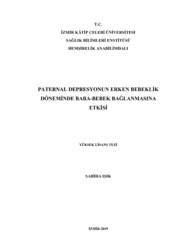Paternal depresyonun erken bebeklik döneminde baba-bebek bağlanmasına etkisi
-
Eser Sahibi
Işık, Sabiha
- Tez Danışmanı Nuray Egelioğlu Cetişli
-
Tür
Yüksek Lisans
- Yayın Tarihi 2019
-
Yayıncı
Sağlık Bilimleri Enstitüsü
- Tek Biçim Adres https://hdl.handle.net/11469/2250
-
Konu Başlıkları
Public health
Halk sağlığı
Nursing
Hemşirelik
Paternal depreyon
Paternal depression
Özet:Giriş- Amaç: Bu çalışmanın amacı paternal depresyonun erken bebeklik döneminde bababebek bağlanmasına etkisini belirlemektir. Yöntem: Tanımlayıcı ve kesitsel tipteki bu araştırma, Aralık 2018-Ağustos 2019 tarihleri arasında eşi İzmir Sağlık Bilimleri Üniversitesi Tepecik Eğitim ve Araştırma Hastanesi'nde doğum yapmış örneklem kriterlerine uyan 124 baba ile yürütülmüştür. Veriler, Birey Tanıtım Formu, Edinburgh Postpartum Depresyon Ölçeği (EPDÖ) ve Baba-Bebek Bağlanma Ölçeği kullanılarak ve iki izlem yapılarak toplanmıştır. Birinci izlem doğum sonrası birinci gün babalarla yüzyüze görüşülerek, ikinci izlem doğumdan sonra ikinci ayda telefon ile görüşülerek yapılmıştır. Verilerin değerlendirilmesinde tanımlayıcı istatistikler, Mann Whitney U ve korelasyon analizi kullanılmıştır. Bulgular: Babaların doğum sonrası birinci günde EPDÖ puan ortalaması 5,25±4,58, ikinci ayda 4,58±4,20 olup, aralarındaki fark istatistiksel olarak anlamlıdır. Doğum sonrası birinci günde depresyon riski 16,9 iken, bu oran ikinci ayda 14,5'tir. Babaların doğum sonrası ikinci aydaki Baba-Bebek Bağlanma Ölçeği toplam puan ortalaması 78,57±8,52, Sabır ve Hoşgörü alt ölçeği puan ortalaması 34,46±6,75, Etkileşimde Zevk alt ölçeği puan ortalaması 26,45±3,92 ve Sevgi ve Gurur alt ölçeği puan ortalaması 17,65±1,90 olarak belirlenmiştir. Doğum sonrası birinci günde ve ikinci ayda depresyon riski yüksek olan babaların doğum sonrası ikinci aydaki Baba-Bebek Bağlanma Ölçeği toplam puan ortalaması ve Sabır ve Hoşgörü alt ölçek puan ortalaması depresyon riski olmayan babalara göre istatistiksel olarak anlamlı şekilde düşüktür. Sonuç: Araştırmadan elde edilen bulgulara göre babalardaki depresyon riski erken bebeklik döneminde baba-bebek bağlanmasını olumsuz etkilemektedir. Paternal postpartum depresyon riski doğum sonrası birinci güne göre ikinci ayda azalmış olmasına rağmen halen devam etmektedir.Summary:Introduction-Aim: This study aims to determine the effect of paternal depression of fatherinfant bonding in early babyhood. Method: This descriptive and cross-sectional study was conducted with 124 fathers meeting the sample criteria whose spouse gave birth in the Tepecik Training and Research Hospital, University of Health Sciences, İzmir between the dates of December 2018 and August 2019. Data were collected by using Individual Identification Form, Edinburgh Postpartum Depression Scale (EPDS) and Father-Infant Bonding Scale and by realizing to follow-up. While the first follow-up was performed through face-to-face interviews with fathers on the postpartum first day, the second follow-up was carried out via telephone in the postpartum second month. Descriptive statistics, Mann Whitney U and correlation analysis were used to evaluate the data. Results: The mean EPDS scores of the fathers regarding the postpartum first day was 5,25±4,58 and 4,58±4,20 for the postpartum second month, thus, the difference between them is statistically significant. While the risk of depression on the postpartum first day was 16,9, it was 14,5 for the postpartum second month. Several scores of the fathers in the postpartum second month were found as follows: The mean of of Father-Infant Bonding Scale total score, 78,57±8,52
the mean score of Patience and Tolerance subscale, 34,46±6,75
the mean score of Pleasure in Interaction subscale, 26,45±3,92
and the mean score of Affection and Pride subscale 17,65±1,90. The mean total score of Father-Infant Bonding Scale and the mean scores of Patience and Tolerance subscale of the fathers with high risk of depression on the postpartum first day and postpartum second months were statistically significantly lower compared to fathers without risk of depression. Conclusion: Based on the results of the research, it is possible to say that the risk of depression in fathers adversely affects father-infant bonding during early babyhood. Although the risk of paternal postpartum depression has decreased in the postpartum second months compared to the postpartum first day, the risk continues.
-
Koleksiyonlar
ENSTİTÜLER
SAĞLIK BİLİMLERİ ENSTİTÜSÜ

 Tam Metin
Tam Metin

